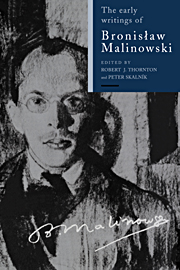Book contents
- Frontmatter
- Contents
- Preface
- Acknowledgements
- Note on the text
- Introduction: Malinowski's reading, writing, 1904–1914
- Malinowski's writings, 1904–1914
- 1 Observations on Friedrich Nietzsche's The Birth of Tragedy (1904/5)
- 2 On the principle of the economy of thought (1906)
- 3 Religion and magic: The Golden Bough (1910)
- 4 Totemism and exogamy (1911–1913)
- 5 Tribal male associations in Australia (1912)
- 6 The economic aspects of the intichiuma ceremonies (1912)
- 7 The relationship of primitive beliefs to the forms of social organization (1913)
- 8 A fundamental problem of religious sociology (1914)
- 9 Sociology of the family (1913–14)
- Notes
- References
- Index
2 - On the principle of the economy of thought (1906)
Published online by Cambridge University Press: 18 December 2009
- Frontmatter
- Contents
- Preface
- Acknowledgements
- Note on the text
- Introduction: Malinowski's reading, writing, 1904–1914
- Malinowski's writings, 1904–1914
- 1 Observations on Friedrich Nietzsche's The Birth of Tragedy (1904/5)
- 2 On the principle of the economy of thought (1906)
- 3 Religion and magic: The Golden Bough (1910)
- 4 Totemism and exogamy (1911–1913)
- 5 Tribal male associations in Australia (1912)
- 6 The economic aspects of the intichiuma ceremonies (1912)
- 7 The relationship of primitive beliefs to the forms of social organization (1913)
- 8 A fundamental problem of religious sociology (1914)
- 9 Sociology of the family (1913–14)
- Notes
- References
- Index
Summary
At every level in contemporary science and philosophy, from the boldest, almost poetic, speculations to the most minute labour of the specialist restricted to his narrow field, one can clearly sense a certain current penetrating the work of the human mind. A stubborn war on metaphysics has been declared on all sides, beginning with Nietzsche, as a representative of inspired philosophy and with his abhorrence of jenseits, and ending in the laboratories of chemistry and physics. The ranks of metaphysicians are growing increasingly thin even among the so-called exact philosophers. At this time it is difficult to determine which side will be victorious. Furthermore, it sometimes appears doubtful that the war is actually waged against the principles of metaphysics, rather than against the expression ‘metaphysics’. Aren't the anti-metaphysicians merely practising the same discipline under a new name?
The fact is that this war will not remain fruitless; it will raise and purify many problems and ideas. We may dare to say that in the field of the natural sciences this tendency has already achieved many durable results and has eliminated many obsolete errors and prejudices which had persisted under the name of metaphysical speculation. However, in philosophy the question, ‘does metaphysics have any right to exist?’ is much more basic, complex, and still fermenting. To answer this question, in addition to the general and fundamental considerations, one must also assess critically the facts pertaining to this struggle. It is into this area that we will now proceed by dealing with one of the basic concepts presented by two of the most outstanding representatives of the anti-metaphysical movement.
- Type
- Chapter
- Information
- The Early Writings of Bronislaw Malinowski , pp. 89 - 116Publisher: Cambridge University PressPrint publication year: 1993



